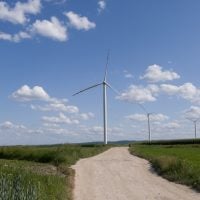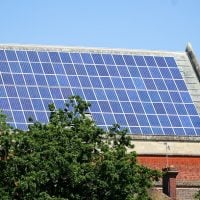The energy transition in Africa is a critical and multifaceted challenge that holds the potential to reshape the continent’s economic landscape and improve the quality of life for millions. As Africa grapples with the dual pressures of rapid population growth and climate change, the need for sustainable energy solutions has never been more urgent. The continent is endowed with abundant renewable energy resources, including solar, wind, hydro, and geothermal energy.
However, despite this wealth of potential, many African nations still rely heavily on fossil fuels, which not only contribute to greenhouse gas emissions but also hinder economic development and energy access. The transition to renewable energy sources is not merely an environmental imperative; it is also an opportunity for economic growth and job creation. By investing in clean energy technologies, African countries can reduce their dependence on imported fossil fuels, enhance energy security, and create a more resilient economy.
This transition is further complicated by the need for substantial financial investment, technological innovation, and capacity building. As such, the role of international donors, particularly from Europe, becomes increasingly significant in supporting Africa’s energy transition journey. Are You Working on Solar Innovation or Clean Energy Access? Join us to receive updates.
Importance of European Donors in Supporting Energy Transition in Africa
European donors play a pivotal role in facilitating Africa’s energy transition by providing financial resources, technical expertise, and policy support. The urgency of climate change has prompted European nations to prioritize sustainable development initiatives, particularly in regions that are most vulnerable to its impacts. By investing in Africa’s energy sector, European donors not only contribute to global climate goals but also foster economic development and stability in a region that is often characterized by political and social challenges.
Moreover, European donors can leverage their experience in renewable energy deployment to assist African countries in overcoming barriers to energy access. This includes sharing best practices, facilitating knowledge transfer, and promoting innovative financing mechanisms that can attract private sector investment. The collaboration between European donors and African nations can lead to the development of tailored solutions that address local needs while aligning with broader sustainability objectives.
As such, the partnership between Europe and Africa is essential for achieving a successful energy transition that benefits both regions.
Overview of the Top 10 European Donors
In the context of supporting Africa’s energy transition, several European countries have emerged as key players. The top ten European donors include Germany, France, the United Kingdom, Italy, Spain, Sweden, the Netherlands, Norway, Denmark, and Switzerland. Each of these nations brings unique strengths and resources to the table, contributing to a diverse array of projects aimed at enhancing renewable energy capacity across the continent.
Germany has been particularly active in promoting renewable energy through its Energiewende initiative, which emphasizes the importance of transitioning to sustainable energy sources. France has focused on developing partnerships with African nations to foster investment in clean energy infrastructure. The United Kingdom has committed significant resources to climate finance initiatives that support renewable energy projects in Africa.
Italy and Spain have also made strides in promoting solar and wind energy projects, while Sweden and the Netherlands have prioritized sustainable development through innovative financing mechanisms. Together, these countries form a robust coalition dedicated to advancing Africa’s energy transition.
Germany’s Role in Energy Transition in Africa
Germany has established itself as a leader in promoting renewable energy initiatives in Africa through its comprehensive approach to development cooperation. The German government has committed substantial financial resources to support projects that enhance access to clean energy across the continent. One notable example is the Energising Development (EnDev) program, which aims to provide sustainable energy solutions to underserved communities in several African countries.
Through this initiative, Germany has facilitated access to electricity for millions of people by promoting off-grid solar solutions and improving energy efficiency. In addition to financial support, Germany has also focused on capacity building and knowledge transfer. The country has partnered with various African governments and organizations to develop training programs that equip local stakeholders with the skills needed to implement renewable energy projects effectively.
By fostering local expertise and promoting technology transfer, Germany is helping to create a sustainable energy ecosystem that empowers communities and drives economic growth.
France’s Contribution to Energy Transition in Africa
France has taken significant steps to support Africa’s energy transition through its commitment to sustainable development and climate action. The French government has launched several initiatives aimed at fostering investment in renewable energy projects across the continent. One such initiative is the French Development Agency (AFD), which provides financing for clean energy projects while prioritizing social and environmental sustainability.
A notable example of France’s involvement is its support for solar energy initiatives in countries like Senegal and Morocco. Through partnerships with local governments and private sector actors, France has facilitated the development of large-scale solar farms that not only generate clean electricity but also create jobs and stimulate local economies. Furthermore, France has actively participated in international forums focused on climate change and sustainable development, advocating for increased collaboration between European nations and African countries.
The United Kingdom’s Support for Energy Transition in Africa
The United Kingdom has emerged as a strong advocate for climate finance and renewable energy initiatives in Africa. Through its Department for International Development (DFID) and other agencies, the UK government has committed significant resources to support clean energy projects across the continent. One of the key components of the UK’s approach is its focus on innovative financing mechanisms that leverage private sector investment alongside public funding.
A prime example of the UK’s commitment is its support for the Power Africa initiative, which aims to increase electricity access in sub-Saharan Africa through investments in renewable energy infrastructure. The UK has also been instrumental in promoting off-grid solar solutions that provide affordable electricity to rural communities. By fostering partnerships between governments, NGOs, and private companies, the UK is helping to create a more sustainable energy landscape that empowers local populations.
Italy’s Impact on Energy Transition in Africa
Italy has made significant contributions to Africa’s energy transition through its focus on renewable energy projects and capacity building initiatives. The Italian government has prioritized investments in solar and wind energy as part of its broader commitment to sustainable development. Through partnerships with African nations, Italy has facilitated the implementation of various clean energy projects that aim to enhance access to electricity while promoting environmental sustainability.
One notable initiative is Italy’s involvement in the African Renewable Energy Initiative (AREI), which seeks to accelerate the deployment of renewable energy technologies across the continent. By collaborating with local governments and organizations, Italy is helping to create a framework for sustainable energy development that aligns with Africa’s unique needs and challenges. Additionally, Italy has invested in training programs that equip local stakeholders with the skills necessary to manage and maintain renewable energy systems effectively.
Spain’s Involvement in Energy Transition in Africa
Spain has recognized the importance of supporting Africa’s energy transition as part of its commitment to global sustainability goals. The Spanish government has actively engaged in various initiatives aimed at promoting renewable energy projects across the continent. Through its development cooperation agency (AECID), Spain has provided financial support for clean energy initiatives while prioritizing social inclusion and environmental protection.
A key area of focus for Spain has been solar energy development in North African countries such as Morocco and Algeria. By investing in large-scale solar power plants and supporting research initiatives, Spain is helping to enhance regional energy security while reducing greenhouse gas emissions. Furthermore, Spain has fostered partnerships with local organizations to promote community-based renewable energy projects that empower local populations and create economic opportunities.
Sweden’s Commitment to Energy Transition in Africa
Sweden has long been a champion of sustainable development and climate action, making significant contributions to Africa’s energy transition efforts. The Swedish government has prioritized investments in renewable energy projects that align with its commitment to achieving carbon neutrality by 2045. Through its development cooperation agency (Sida), Sweden has provided financial resources for various clean energy initiatives across the continent.
One notable example of Sweden’s involvement is its support for off-grid solar solutions that provide electricity to rural communities in countries like Uganda and Tanzania. By promoting innovative financing models that enable local entrepreneurs to invest in solar technologies, Sweden is helping to create sustainable business opportunities while enhancing access to clean energy. Additionally, Sweden has actively participated in international forums focused on climate change, advocating for increased collaboration between European donors and African nations.
Netherlands’ Contribution to Energy Transition in Africa
The Netherlands has established itself as a key player in supporting Africa’s energy transition through its focus on innovative financing mechanisms and public-private partnerships. The Dutch government has prioritized investments in renewable energy projects that promote sustainability while addressing social challenges such as poverty and inequality. Through its development cooperation agency (DGIS), the Netherlands has provided financial resources for various clean energy initiatives across the continent.
A prime example of the Netherlands’ involvement is its support for the Green Climate Fund (GCF), which aims to mobilize funding for climate-resilient projects worldwide. By contributing to this fund, the Netherlands is helping to facilitate investments in renewable energy infrastructure that enhance access to electricity while promoting environmental sustainability. Furthermore, the Dutch government has fostered partnerships with local organizations and businesses to promote community-based renewable energy projects that empower local populations.
The Future of European Donors in Energy Transition in Africa
As Africa embarks on its journey toward a sustainable energy future, the role of European donors will remain crucial in facilitating this transition. The collaborative efforts between European nations and African countries have already yielded significant progress; however, much work remains to be done. Continued investment in renewable energy infrastructure, capacity building initiatives, and innovative financing mechanisms will be essential for overcoming existing barriers and ensuring equitable access to clean energy.
Looking ahead, it is imperative for European donors to strengthen their partnerships with African governments, civil society organizations, and private sector actors. By fostering collaboration and knowledge sharing, these stakeholders can develop tailored solutions that address local needs while aligning with broader sustainability objectives. As Europe continues to prioritize climate action and sustainable development, its commitment to supporting Africa’s energy transition will play a vital role in shaping a more resilient and prosperous future for both regions.
In the context of the “Top 10 European Donors Supporting Energy Transition in Africa,” it’s essential to consider the broader landscape of international funding and support for sustainable development. A related article that highlights the importance of community-driven projects in fostering sustainable growth is the “Noosa Council’s Community Project Grants – Australia.” This initiative underscores the significance of local engagement and funding in achieving long-term environmental goals. For more information on this program, you can read the full article by following this link.









































